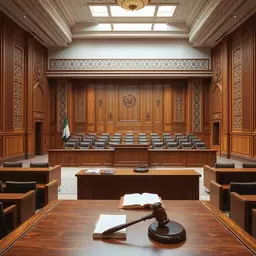Plea Bargaining in UAE Explained

Understanding plea bargaining is essential for anyone navigating the legal landscape in the UAE. It not only facilitates more efficient resolutions of criminal cases but also embodies a significant shift towards a modern legal framework. As you delve into this process, consider how it can empower defendants and promote transparency within the justice system.
What You Will Learn
- Plea bargaining allows defendants to negotiate guilty pleas for lesser charges or lighter sentences, streamlining the judicial process.
- Federal Decree-Law No. 38/2022 establishes a comprehensive legal framework for plea bargaining, detailing conditions, rights, and procedures.
- Misconceptions about plea bargaining include the belief that only guilty individuals can negotiate deals or that plea bargains are limited to serious crimes.
- Critics argue that plea bargaining may pressure innocent defendants to accept deals, potentially undermining the justice system.
- Victim rights are an essential consideration, ensuring victims are informed and can participate in the plea bargaining process.
Plea Bargaining Process Overview
The following visual outlines the key steps and considerations involved in the plea bargaining process as defined under UAE legislation. For more insights into the broader legal framework, consider exploring navigating criminal cases in Dubai.
Step 1: Negotiation
Defendant negotiates with the prosecution to reach a plea agreement, considering the potential charge reductions and sentencing adjustments.
Step 2: Agreement Formalization
Once negotiations conclude, the plea agreement is formalized as per Article 362, ensuring all legal requirements are met.
Step 3: Judicial Review
The judiciary reviews the plea agreement as stated in Article 363, ensuring it aligns with legal standards and justice.
Step 4: Sentencing
If accepted, the plea agreement leads to sentencing based on the terms agreed upon, allowing for a more efficient resolution.
Key Considerations
Plea bargaining must consider factors such as judicial oversight, victim rights, and transparency throughout the process.
Comprehensive Overview of Plea Bargaining in UAE Criminal Cases
Plea bargaining is an essential aspect of the criminal justice system, and understanding it is crucial for anyone navigating legal challenges in the UAE. It provides a path for defendants to resolve cases more efficiently while potentially reducing penalties. This new approach marks a significant shift in how the UAE handles criminal cases, reflecting a more modern legal framework.
Defining Plea Bargaining: A New Approach in the UAE Legal System
Plea bargaining involves negotiations between the defendant and the prosecution, allowing the defendant to plead guilty to a lesser charge or receive a lighter sentence. This practice can significantly impact the outcome of a case. In the context of the UAE, plea bargaining is designed to streamline judicial processes, alleviate court congestion, and offer defendants a chance to mitigate penalties. To better understand how these processes fit into broader legal strategies, you might find our article on criminal defense strategies in the UAE helpful.
As someone who has seen the evolution of legal practices in the UAE, I believe this approach can empower individuals. By understanding plea bargaining, defendants can make informed choices about their legal options and navigate the complexities of the justice system more effectively. If you’re curious about how this process works, let’s explore further!
The Legal Framework of Plea Bargaining Under Federal Decree-Law No. 38/2022
Federal Decree-Law No. 38/2022 provides a legal foundation for plea bargaining in the UAE. This law outlines specific articles that detail the procedures and implications of plea agreements. Understanding these regulations is vital for anyone considering a plea bargain.
- Article 360: Establishes the conditions under which plea bargaining may occur.
- Article 361: Outlines the rights of the defendant in plea negotiations.
- Article 362: Specifies the process for formalizing plea agreements.
- Article 363: Discusses the role of the judiciary in accepting or rejecting plea deals.
This framework is crucial in guiding the legal practice of plea bargaining. By following these articles, defendants are better informed about their rights and the benefits that come with engaging in this process. It’s an important step towards maintaining fairness and transparency in our legal system.
UAE Criminal Procedure Code: Implications for Plea Bargaining
The UAE Criminal Procedure Code also plays a significant role in shaping plea bargaining practices. This code interacts with the provisions laid out in Federal Decree-Law No. 38/2022, providing additional context and regulations for plea negotiations.
Key implications include:
- Judicial Oversight: The court must approve any plea agreement, ensuring that justice is served.
- Transparency: The process should be clear to all parties involved, safeguarding the rights of the defendant.
- Victim Considerations: The interests of victims are also taken into account during plea negotiations.
This interaction between the Criminal Procedure Code and plea bargaining laws helps create a balanced approach to justice. As someone deeply invested in educating others about their rights, I emphasize the importance of understanding these legal intricacies. The more informed individuals are about their rights, the better equipped they are to navigate their legal journeys! For specific details on how past legal issues can influence current proceedings, you can read more about the impact of past convictions on sentencing.
Exploring the Scope and Application of Plea Bargaining in UAE
Quick Summary
Here's a brief recap of the key points discussed so far:
- Plea bargaining is a vital part of the UAE criminal justice system, allowing defendants to resolve cases efficiently.
- Federal Decree-Law No. 38/2022 provides the legal framework for plea negotiations, outlining the rights of defendants and the judicial process.
- Common misconceptions about plea bargaining include the belief that it is only for guilty individuals or serious crimes.
Addressing Common Misconceptions Surrounding Plea Bargaining
Myth-Busting: Clarifying Misunderstandings in Plea Bargaining
Plea bargaining can often seem like a mysterious process to many, leading to a variety of misconceptions. One common myth is that agreeing to a plea bargain means automatically admitting guilt. However, this isn’t always true! In some cases, defendants may choose a plea bargain to avoid the uncertainties of a trial, not necessarily because they are guilty.
Another prevalent misunderstanding is that plea bargaining is exclusive to serious crimes. In fact, it can apply to a wide range of offenses. Many people don’t realize that even minor felonies and misdemeanors can be eligible for plea negotiations. To clarify these points, here’s a quick list of common misconceptions:
- Plea bargains are only for guilty individuals.
- They can't be negotiated for minor offenses.
- Accepting a plea bargain eliminates any possibility of appeal.
- Plea bargaining happens only in the courtroom.
Legal Risks and Criticisms: A Balanced Perspective on Plea Bargaining
While plea bargaining offers several advantages, it’s essential to consider the potential legal risks and criticisms associated with it. Critics argue that plea bargains can sometimes lead to unjust outcomes, where defendants feel pressured to accept deals even if they are innocent. This is a significant concern, as it may result in a compromised sense of justice.
Additionally, the lack of transparency in some plea negotiations can raise ethical questions. For instance, some defendants may not fully understand the implications of their decisions. Here are some key criticisms to keep in mind:
- Defendants may feel coerced into accepting unfavorable terms.
- Victim rights might be overlooked in the negotiation process.
- The overall public perception of justice could be diminished.
- Judicial resources may still be burdened despite expedited resolutions.
Victim Rights in the Context of Plea Bargaining
Victims often find themselves on the sidelines during plea bargaining discussions, which raises important questions about their rights. In the UAE, it’s crucial to ensure that victims are considered in the process. They have the right to be informed and to participate in discussions that may affect the outcomes of their cases.
Often, victim rights in plea negotiations can include:
- The right to attend hearings related to plea deals.
- Access to information about the plea agreement terms.
- The opportunity to provide input on the plea deal.
- Notification of the final decision made by the court.
Understanding these aspects helps to promote a more balanced approach, where the rights of both defendants and victims are acknowledged. At UAE Criminal Defense Insights, we believe that every party involved deserves a fair chance to be heard in the legal process. For a deeper look into individual rights during legal proceedings, you may want to review our article on understanding suspects' rights in UAE.
Frequently Asked Questions about Plea Bargaining in the UAE
- What is plea bargaining in the UAE? Plea bargaining is a legal process in the UAE where a defendant negotiates with the prosecution to plead guilty to a lesser charge or receive a lighter sentence, aiming for a more efficient resolution of criminal cases.
- What is the legal basis for plea bargaining in the UAE? Plea bargaining in the UAE is primarily governed by Federal Decree-Law No. 38/2022, which outlines the conditions, rights, and procedures for plea agreements.
- Can plea bargaining apply to minor offenses? Yes, contrary to a common misconception, plea bargaining can apply to a wide range of offenses, including minor felonies and misdemeanors, not just serious crimes.
- Are victims' rights considered during plea bargaining? Yes, victim rights are an essential consideration. Victims have the right to be informed, attend hearings, provide input, and be notified of the final decision regarding plea deals.
- What are some criticisms of plea bargaining? Critics argue that plea bargaining may pressure innocent defendants to accept deals, potentially leading to unjust outcomes, and that it can raise ethical questions due to a lack of transparency.
Recap of Key Points
Here is a quick recap of the important points discussed in the article:
- Plea bargaining serves as a modern tool in the UAE legal system, allowing defendants to negotiate for lesser charges or reduced sentences.
- Federal Decree-Law No. 38/2022 outlines the legal framework for plea bargaining, including the rights of defendants and the roles of the judiciary.
- The UAE Criminal Procedure Code emphasizes judicial oversight, transparency, and victim considerations during plea negotiations.
- Common misconceptions about plea bargaining include the belief that it is only for guilty individuals and that it cannot apply to minor offenses.
- Critics of plea bargaining highlight concerns regarding potential coercion, victim rights, and the public perception of justice.
- Victims have specific rights in the plea bargaining process, including the right to be informed and to participate in discussions regarding plea deals. For more detailed case studies related to plea agreements, you can explore plea bargains in UAE criminal cases.
Popular Posts
 Understanding the intricacies of the criminal defense trial in the UAE can significantly impact your
Understanding the intricacies of the criminal defense trial in the UAE can significantly impact your
 Understanding the complexities of the legal system can be daunting, especially when facing criminal
Understanding the complexities of the legal system can be daunting, especially when facing criminal
 Understanding your legal rights is not just important; it's essential for anyone navigating the comp
Understanding your legal rights is not just important; it's essential for anyone navigating the comp
 As financial crimes continue to evolve, understanding their implications is crucial for navigating t
As financial crimes continue to evolve, understanding their implications is crucial for navigating t
